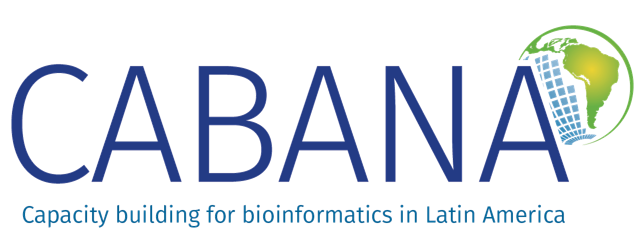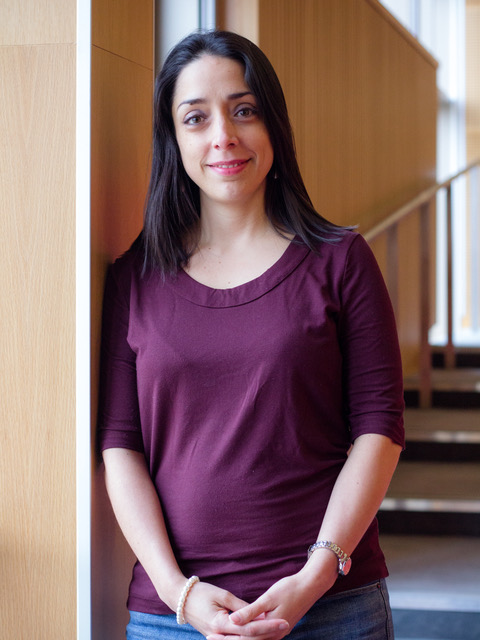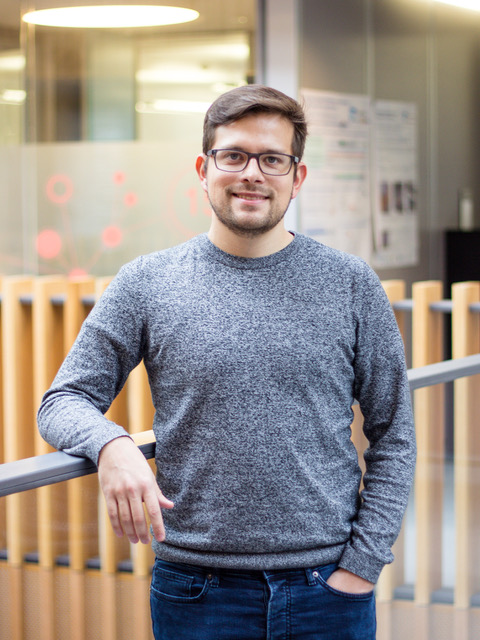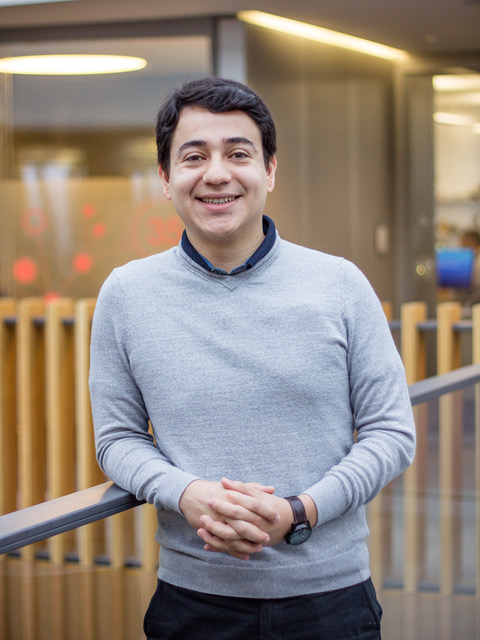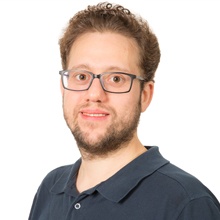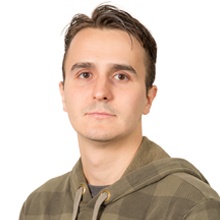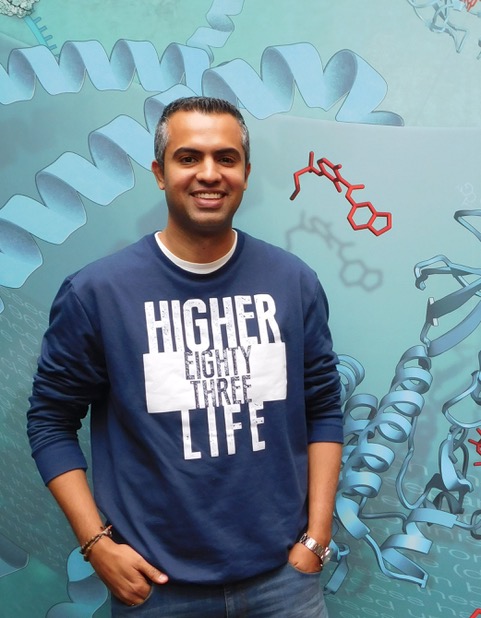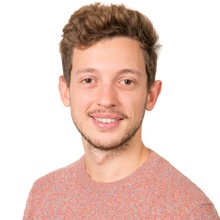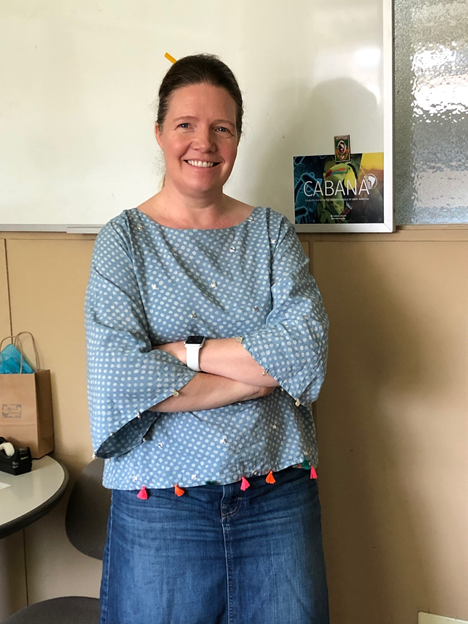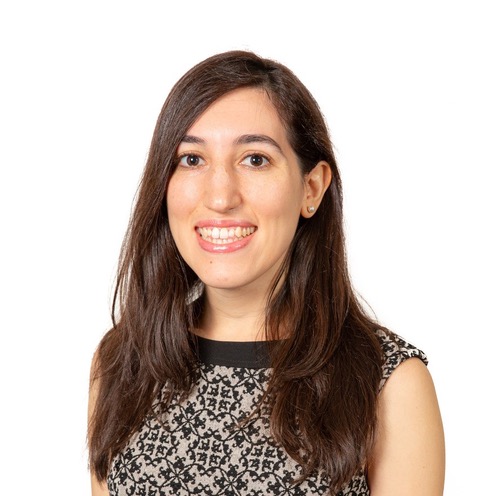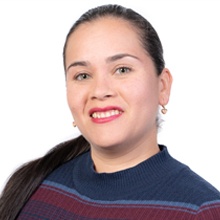Rebeca Campos-Sanchez
|
Rebeca Campos-Sanchez is a professor of Molecular Biology and Bioinformatics at the University of Costa Rica (UCR) since 2005. Her PhD studies took her to The Pennsylvania State University where she worked on genomics and bioinformatics graduating in 2015. With the plan to continue working on genomics on return to Costa Rica, to her surprise bioinformatics was still exclusive to a small group of researchers with previous experience in the field or with strong international collaborators. Her goal since then has been to enlarge the community and consolidate this field by the creation of RedBioAplicada and supporting the Bioinformatics and Systems Biology Masters program. With that in mind Rebeca proposed a secondment project to work with Cath Brooksbank and the training team at EMBL-EBI in the UK which took place between August 2018 and February 2019. The project’s title is ‘Developing data analysis resources for Costa Rica: e-Learning as an alternative and complement to lectures and workshops’. The project started as a local initiative to accelerate the learning process of Costa Rican students using tutorials written in Spanish and to evaluate if the English language is a barrier in the speed of learning. However, the project now has international connotations, the idea is that after testing the tutorials in a group of volunteers with different levels of bioinformatics experience, it will be made available to the Latin American community through the CABANA e-Learning platform. Eventually, the materials will be translated to other languages. On her return to Costa Rica, Rebeca has been editing the tutorials she developed at EMBL-EBI and is testing them on the students from Costa Rica prior to their publication. The first two tutorials to be published will be on transcriptomics using a reference genome and metagenomics applied to the challenge areas Sustainable Food Production and Protection of Biodiversity, respectively. Rebeca has initiated multiple new conversations and ideas aimed at enhancing bioinformatics awareness and competence in Costa Rica. These include the planning of two workshops (together with CABANA co-PIs in Costa Rica) and discussions with directors of programs to include basic bioinformatics lessons or courses as part of undergraduate programs. Rebeca is also actively enquiring about the feasibility of creating a sequencing facility with the resources at the UCR. The hope would be to speed up the adoption of bioinformatics for the advancement of science and its multiple applications in Costa Rica. |
Guillermo Rangel
|
Guillermo Rangel is a Chemical Engineer and Microbiologist from the Universidad de los Andes (Bogota, Colombia), with a Master´s degree in Biological Sciences. During my Master’s degree, I developed a great interest in bacteriophage biology and evolutionary ecology, this led me to pursue a PhD degree on this field. In 2014 I began my PhD at University of Leicester (Leicester, UK) under the supervision of Professor Martha Clokie, undertaking research exploring the diversity of Streptococcus pneumoniae bacteriophages and providing insights into their role in pneumococcal virulence. During my PhD I developed an appreciation for the numerous opportunities that bioinformatics and big data analysis offer to the study of bacteriophage-host interactions at the microbiome level. Viruses lack universally conserved marker genes and therefore require the application of alternative approaches for their taxonomic classification in metagenomic datasets. Previous work conducted by Dr. Alejandro Reyes’s research team at the Universidad de los Andes identified a subset of profile Hidden Markov Models (HMMs) that could serve as taxonomic markers for a wide range of currently known viral clades. My research secondment project, supervised by Dr. Rob Finn (EMBL-EBI) and Dr. Alejandro Reyes, is aimed at assessing the potential profile HMMs have for accurately classifying viral sequences from metagenomic datasets into their corresponding taxonomic clades. The output from this project is intended to contribute to the expansion of the analysis pipeline currently employed by MGnify, the open-source EBI’s metagenomic analysis tool developed by Dr. Rob Finn’s team. |
César Prada
|
César Prada Medina is a Ph.D. student at the University of São Paulo, Brazil, in the Department of Clinical Analysis, School of Pharmaceutical Sciences. After he obtained his Biology BSc, he worked at the Research Center for Tropical Diseases (CINTROP) in Colombia and began pursuing a Systems Biology career. Having merged this goal with his biomedical experience allowed his encounter with Helder Nakaya and his further adhesion to the Computational Systems Biology Laboratory. Currently, his major research goal is to better characterize the physiopathological heterogeneity of the Juvenile Idiopathic Arthritis (JIA) disease. His investigation aims to reveal the leukocyte gene expression programs that drive the chronic inflammation in JIA patients. By combining statistical meta-analysis and network medicine principles, he hopes to contribute to approach a more personalized clinical practice on JIA patients. As a CABANA fellow (Sept 2018 - March 2019), César joined the Expression Atlas team at EMBL-EBI to expand the Expression Atlas repository on JIA. In a conjunct effort with the Expression Atlas (EA) team, the majority of the Juvenile Idiopathic Arthritis (JIA) gene expression studies were made available through the Expression Atlas database. During this process, an update on the Experimental Factor Ontology (EFO) repository regarding JIA classification was promoted. These constitute permanent contributions to the scientific community. In addition, the secondment served to secure a collaboration between César’s lab, the Computational Systems Biology Laboratory (CSBL), and the EA team around the meta-analysis of gene expression studies. The CSBL plan to launch a web tool to perform, on demand, gene expression meta-analysis of publicly available data, including the EA resources. César describes his time at EMBL-EBI as a CABANA secondee as 'an enriching and productive experience |
Valeria Faggioli |
Valeria Faggioli is a Post-Doctoral student at The National Institute of Agriculture Technologies (INTA), Argentina, in the Department of Soil Science and Crop Production (Marcos Juarez, Cordoba Province). She obtained her BSc in Agronomy, MSc in Soil Fertility, and PhD in Natural Sciences. The goal of her current investigations is to elucidate the impact of agricultural practices in microbial biodiversity studying long-term experiments. Preservation of local biodiversity is a key factor in sustainable production. Agricultural soils can harbour diverse communities of microorganisms providing key ecosystem services such as nutrient cycling, chemistry and structure of soil, and plant productivity. To carry out sustainable agriculture, the understanding of the composition of microbial communities as well as changes induced by human practices demands the generation of experimental evidence. As a CABANA fellow, the aim of her project is to investigate the impact of long-term anthropogenic practices on soil bacterial and fungal communities using high throughput sequencing techniques and MGnify platform for the analysis of sequences in the Rob Finn’s research group at the EBI EMBL. This study pursues a complete taxonomic classification of the existing taxa and it will represent an unprecedented dataset from Latin America. |
Daniel Koile
|
Daniel Koile studied Computer Science at the University of Buenos Aires, Argentina, at the faculty of exact and natural sciences. After his master's degree, he started his PhD in the Bioinformatics Core Facility of the Biomedicine Research Institute of Buenos Aires - CONICET - partner institute of the Max Planck Society (IBioBA-CONICET-MPSP) under the supervision of Dr. Patricio Yankilevich. He has been working there since 2013, his main project being the development of GenIO, a phenotype-genotype analysis web server design to assist clinical genomics researchers and medical doctors in the diagnostic process of rare genetic diseases. During his CABANA secondment at the EMBL-EBI, he is working in Henning Hermjakob’s team, with Reactome, a free, open-source, curated and peer-reviewed pathway database. His project includes taking part in the curation process of the Reactome database, developing the online training module “Reactome as a Tool for Disease Analysis”, suitable for use in the context of Reactome outreach as well as future CABANA activities, and the feasibility study and posterior integration of Reactome with GenIO, aiming to improve the analysis for candidate genes. Additionally, he considers that being at the EMBL-EBI it is the perfect opportunity for networking to build up to future collaborations, and improving his teaching abilities. |
Agustin Pardo
|
Agustin Pardo did his Master’s degree in Biological Sciences at Facultad de Ciencias Exactas y Naturales, Universidad de Buenos Aires. During his Master’s degree he applied a multiomics approach which takes into account structural, metabolic and genomic information with the aim of predicting new molecular targets of the human pathogens. Currently, he is undertaking his Ph.D. at the Facultad de Ciencias Exactas y Naturales, in the department of Biology Chemistry. He has been involved in different projects relating to Bioinformatics. With the aim of expanding the multiomics approach of predicting new molecular targets, he is working with a method that simulates the flow of metabolites through a genome-scale metabolic network reconstruction of Mycobacterium tuberculosis. Metagenomics are among other of his subjects of interest, in which he has been working with 16S sequencing soil samples, analysing it’s phylogenetic diversity with the aim of taking the best decisions to apply bioremediation methods to the sample sources. As a CABANA secondee, Agustin is working with the Reactome group leading by Henning Hermjakob at EMBL-EBI. In the Reactome database there are few metabolic human-Mycobacterium tuberculosis interaction pathways. In this context, the project consists of the expansion and update of those Reactome pathways. He has been trained in how to construct pathogens metabolic networks using genomic information, and how to curate and analyse them with bioinformatic tools and bibliographic information. The study is a good opportunity to gain experience and new perspectives in metabolic reconstruction and pathway curation, and he hopes this secondment would be a starting point for further collaborations between the EMBL-EBI and Latin America. |
Rodrigo Ochoa
|
Rodrigo Ochoa is a third year PhD student in Chemical Sciences at the University of Antioquia, Colombia, associated to the Max Planck Tandem Group in Biophysics of Tropical Diseases. His current research involves the development and application of computational methodologies for the design of high-affinity binding peptides to relevant protein targets. The project involves the use of structural bioinformatics and biophysics simulations to design peptides that can be used as potential vaccines for Neglected Tropical Diseases. During his secondment project at EMBL-EBI, a structural analysis of the binding promiscuity of MHC class II alleles will be followed. A complimentary second part will include the study of some proteases interaction profiles of interest for Dr. Janet Thornton's group at EMBL-EBI, using similar structural and evolutionary tools. For Latin American researchers like Rodrigo, the current tools, databases and expertise of the researchers at EMBL-EBI is a valuable resource for those working on the bioinformatics and computational biology fields. "This is why projects such as CABANA can provide connections with top research labs in Europe and Latin America, improving the competitiveness of the trainees and their research centres. The secondment opportunity will give me novel skills and network opportunities to share my work and contribute to the scientific community. |
Federico Agustin Vignale |
Federico Agustin Vignale is a PhD student at the University of Buenos Aires, Faculty of Exact and Natural Sciences (Argentina), with a Master’s degree in Microbiology and Biotechnology. In 2014, he was awarded as outstanding student of the University of Buenos Aires for receiving the Gold Award and the Best Model Award in the International Genetically Engineered Machine Competition (iGEM), in which he developed an arsenic biosensor for drinking water. In 2015, he continued working in the field of Synthetic Biology, developing artificial cellulosomes for the production of biofuels. Currently, he does research in Microbial Ecology and Bioinformatics, supervised by Dr. Rob Finn (EMBL-EBI) and Dr. Adrian Turjanski (CONICET). As a CABANA research secondee, he aims to characterize Arsenic Metabolism in Microbial Mats and Microbialites from High-Altitude Andean Lakes. The data resulting from this work will hopefully prove a cornerstone for further studies on these extreme Andean microbial ecosystems. |
Hannele Lindqvist-Kreuze |
Hannele Lindqvist-Kreuze is a Molecular Breeder at the International Potato Center (CIP) in Lima, Peru. She is originally from Finland and received her MSc in Agronomy (Plant Pathology) from the University of Helsinki and her PhD is Molecular Plant Pathology from the Swedish University of Agricultural Sciences. At CIP she has worked on potato genomics and specifically on biotic stress resistance since 2004. As more genomics and bioinformatics tools became available for polyploid crops she started to explore their use in the breeding program of CIP and realized that their use is often more of an academic exercise than a real tool utilized in the breeding programs to reach increased genetic gains. To solve this, more training is needed so that the researchers feel comfortable with the approach of genomics assisted breeding. With that in mind Hannele proposed a project she implemented with Jose De Vega and his team at Earlham Institute in the UK as part of her CABANA secondment (January 2019 to April 2019). The final goal of the project is to increase the capacity of Latin American breeder of autopolyploid crops in using modern genomics tools in their breeding programs. The project started with already existing real-life data generated in the CIP breeding program of tetraploid potato that was used to develop a bioinformatics workflow starting from marker identification and ending in the identification of genomic regions responsible for the trait of interest. Eventually, the workflow will be validated using other data. The workflow and the tools have already been used as an example during the CABANA workshop “Exploring Biodiversity through Bioinformatics” that took place at CIP April 9-12, 2019, where Hannele was one of the Trainers. Hannele reports that she is now much more fluent in using linux and R. Additionally, the newly created network between CIP and Earlham has prompted the exploration of the possibilities of a shared research project. |
Carla Valeria Filippi |
Carla Valeria Filippi is a post-doc funded by the National Council of Research and Technology (CONICET), conducting her academic activities at the National Institute for Agriculture Research (INTA). She also teaching assistant of biostatistics at the Moreno National University. At INTA, she is enrolled in the Sunflower Genomics Group, which seeks to apply and integrate the concepts and technologies of genomics to assist crop breeding. During her Ph.D. thesis, she performed the genetic characterization and fingerprinting of a sunflower breeding collection and conducted an association mapping study for crop quantitative disease resistance. As a postdoc, she is currently working on the identification and characterization of functional genetic variations associated with fungal disease resistance in sunflower, through population approaches as genome-wide association studies and expression quantitative trait loci (eQTL) mapping. As a CABANA fellow, Carla is part of the Ensembl Plants team at EMBL-EBI in the UK. Her project involves conducting population genomics and genetic diversity studies (combining the data produced during her Ph.D. and post-doc with sunflower dataset available from public databases), as well as the genome-wide identification and characterization of genes encoding disease resistance proteins, for potential crop improvement. “I consider that this secondment at EMBL-EBI is a great opportunity to improve my bioinformatic and teaching skills, and to strengthen the relationship with partners of the hosting institute. This is significant to support the development of the bioinformatics field in my institution and to spread the knowledge to the academic institutions in Argentina and the region |
Mayra Osorio
|
Mayra Osorio is a PhD student at the Pontificia Universidad Javeriana, Colombia, and attached to the Plant and Crop Biology lab of the Department of Biology. She previously held a research assistant position at the Institute of Advanced Studies - IDEA, Venezuela, developing tissue culture protocols for cassava and cocoa and characterizing crop genetic diversity using molecular markers. She received a MSc degree in Advanced Biotechnology from the University of Andalucía, Spain. Her main career concerns are food safety and sustainable agriculture, both highly affected by the climate change as global warming enhances the incidences of abiotic stress in plants. The phenotypic response to stress in plants is very complex and supported, at the epigenetic level, in a wide reprogramming of gene expression, involving various regulatory networks that ensure different levels of stress response and tolerance. Cocoa is a native species of the Amazon tropical rainforest with cultural, nutritional and commercial importance in Latin America and other countries of the world. As a CABANA fellow, the aim of her project is to characterize and compare the phenotypic response to water deficit stress of two cocoa genotypes with contrasting physiological behaviour to this kind of stress. Using a transcriptomic approach (RNAseq), she expects to develop analysis pipelines for differential expression analysis of transcriptomic data, coexpression and regulatory network modelling, and comparative transcriptomics at the EMBL-EBI Gene Expression Team lead by Dr Irene Papatheodorou. The experience of the researchers and the computational tools and resources of EMBL-EBI are invaluable to achieve this goal. Being an EBI secondee, Mayra hopes to acquire the bioinformatics skills to generate useful knowledge from transcriptomics data analysis, allowing an understanding of water deficit response in cocoa and to identify key genes supporting tolerance to this stress. This knowledge should benefit breeding programs and contribute to enhance yield, sustainability and welfare around cocoa cropping |
